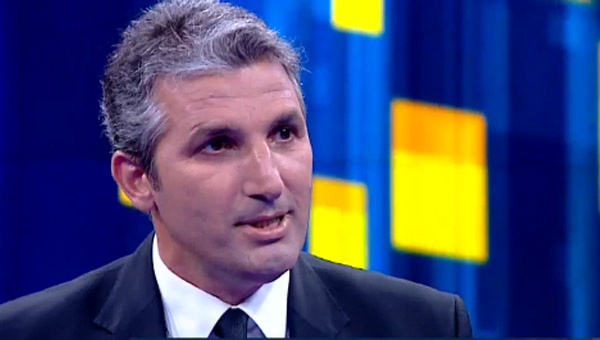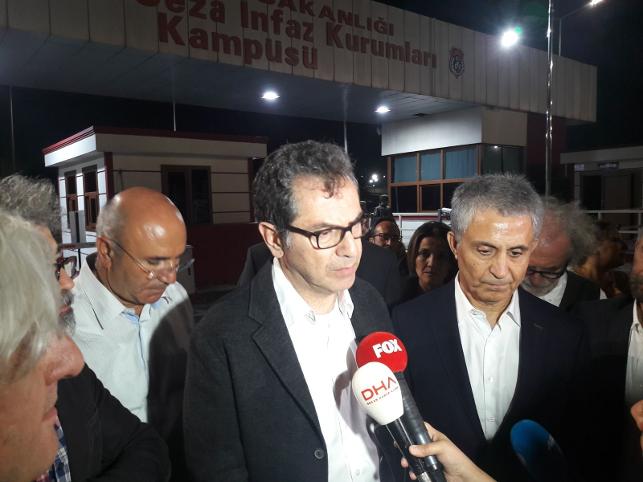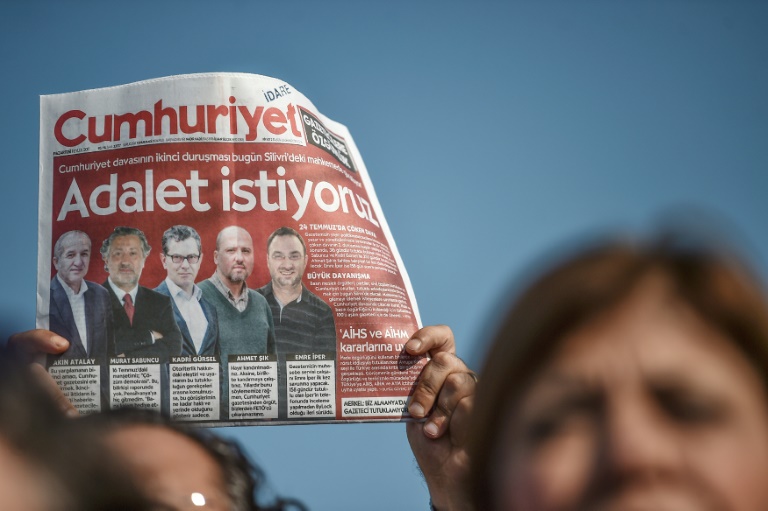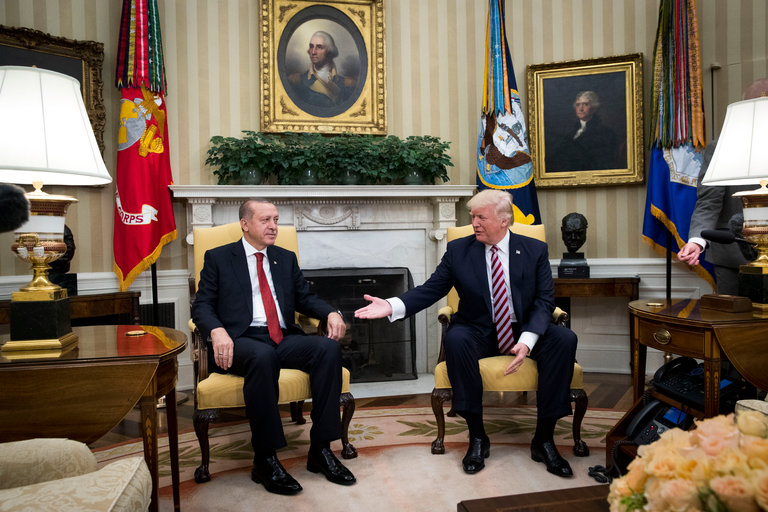Six years ago, when Journalist Nedim Sener was imprisoned, Oguz Guven was among hundreds to protest his arrest outside a detention center in Istanbul. Now Mr. Guven is in prison and the one who reported him is Mr. Sener. His crime: A news report headline.
Turkey’s leftist and secular opposition media has found itself in a rare moment of internal squabble after the imprisonment of Cumhuriyet daily’s internet editor Mr. Guven on Monday.
Mr. Guven suddenly found himself at crosshairs of political rage after a controversial Cumhuriyet headline. What landed him in jail, however, was a different story, a combined product of House of Cards style media drama and betrayal driven by endemic witch-hunt that roiled every segment of the Turkish society.
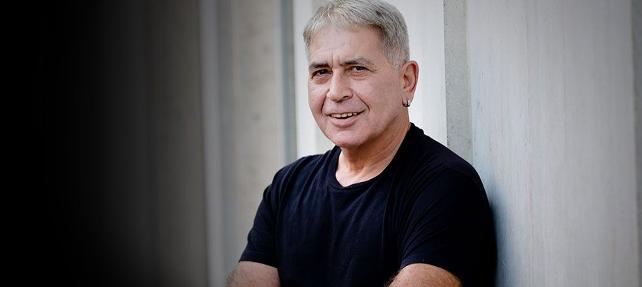
Turkey’s journalists do not only feel besieged in a gutted media landscape by the perpetual menace of political crackdown and threat of jail over their works. But social mobbing, finger-pointing and witch-hunt from fellow journalists constitute other, and more threatening, problems that ruin their lives.
The arrest of editor Guven is the latest case in point, offering a startling account of the toxic culture that permeated in the media environment and poisoned mutual trust between fellow journalists.
13 Mart 2011. Oğuz Güven Ahmet Şık ve Nedim Şener serbest bırakılsın diye eylemde. Başka sözüm yok. pic.twitter.com/azqtOTi6Bh
— Fergün Atalay (@fergunatalay) May 12, 2017
Oguz Guven (R) was seen as waiting with others for Nedim Sener 6 years ago.
When Nedim Sener was placed behind bars, Mr. Guven closed ranks around his colleague, showed a spirited solidarity to fight back against the encroachment of political pressure on media in 2011. But on Friday, after a controversial headline by the Cumhuriyet daily over the death of a prosecutor overseeing coup trial, Mr. Sener took a very different stance that left jaws wide open among media members.
Sevgili Orhan Erinç büyüğümüz, şu başlığı atan hayvanı Cumhuriyet çatısı altında tutmayın pic.twitter.com/5ZWcH9AM7H
— Nedim Şener 🇹🇷 (@nedimsener2010) May 11, 2017
He did not return the favor or displayed gratitude to Mr. Guven for his support 6 years ago. Before Mr. Guven’s arrest, Nedim Sener even publicly campaigned and lobbied on social media for the firing of Mr. Guven from the Cumhuriyet daily whose editor-in-chief, 12 reporters and writers have already been in prison.
Nedim Sener held responsible Mr. Guven for the Cumhuriyet headline in which it said a truck killed a prosecutor in a traffic accident. In the headline that wrought heated debates in media, Cumhuriyet said: “Truck mowed prosecutor who prepared first FETO indictment.” The verb selection, use of “mow,” — which is used in English to describe someone killing people in great numbers, as in a battle, or cut down (grass) — instead of “kill,” constituted the core of controversy about linguistics and semantics.
Detractors of Mr. Guven, including Nedim Sener, were quick to claim that the newspaper “celebrated” the death of the prosecutor in a jubilant mode, giving an air of euphoria with the verb selection. But that interpretation to justify the arrest of a journalist was, according to many sensible and sane journalists, utter nonsense.
At the end, Mr. Sener who had long portrayed himself as the champion of media freedom and a fighter against political subversion of media landscape this time appeared to have lobbied firing of a man who defended him 6 years ago.
Soon after his social media crusade, Prosecutor Yasemin Baba launched an investigation into the news story and the “sensational” headline. What was more jarring was the fact that Ms. Baba extended the probe into 32 readers who commented on the story on the Cumhuriyet website. To the prosecutor, readers’ comments contained elements of “hatred and criminal activity.”
Mr. Sener’s unscrupulous act cost him many supporters who were otherwise dispositioned to see him as a past victim of the government intimidation. But no more.
For someone who spent one year in jail over his critical reports and who won 2013 International Press Freedom Award by Committee to Protect Journalists (CPJ), his stance appears to be unfathomable and eludes a reasonable explanation.
To the astonishment of neutral observers, Mr. Sener recently espoused political beliefs identical with those of President Recep Tayyip Erdogan, the very same politician who played the essential part in the story of his landing in jail. Nedim Sener has emerged consistently effusive of Mr. Erdogan’s authoritarian clampdown on his political enemies on media and civil society.
He appeared unrepentant over his heartfelt embrace of Mr. Erdogan’s anti-democratic policies, prompting a swift rebuke from friends and allies across the lines of secular opposition. They otherwise largely ignored his defense of the government crackdown on the Gulen-linked media.
Mr. Sener who presents himself as an avowed and unapologetic Gulen critic saw in Mr. Erdogan a capable leader to finish off any sympathizer of the U.S.-based cleric in the state apparatus. Thus he offered an unwavering backing of the purge of 150,000 public officials regardless of any concern for the due process. The fact that all of them have been summarily fired without an investigation or a hint of wrongdoing was no disturbing for him.
But when he returned his fire on a Cumhuriyet editor, seeking his ouster and finger-pointing him, it represented a breaking point that drove a wedge between him and the secular opposition. Mr. Sener’s voluntary salvos on behalf of Mr. Erdogan might not have been problematic for a good deal of time for the secular community. But he is on the radar now. He lost much of his hard-won credibility, and he is no longer seen as a champion of press freedom.
Against this backdrop, Mr. Guven’s arrest, therefore, laid bare the factional fissures, which had been largely remained on sidelines or not seen worthy enough to bring to the fore in the post-coup era, on vivid display.
International PEN and other press advocacy groups reacted to arrest of the Cumhuriyet editor, calling on the Turkish authorities to release him. The barrage of public outrage would hardly sway the decision of Turkish officials who have so far remained unfazed about international umbrage over infringement on liberties and freedoms.
Upon his arrest, Mr. Guven said there is nothing to do in the face of such rotten legal system. He was jailed on charges of terrorism propaganda and sent to one of the most notorious prisons of Istanbul, Metris prison, where famous mafia and national mob bosses are held.
********
This article was possible thanks to your donations. Please keep supporting us here.


